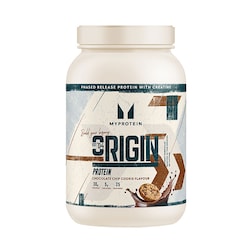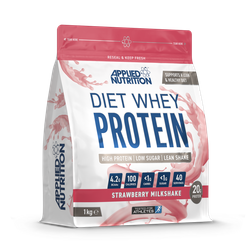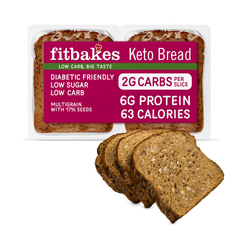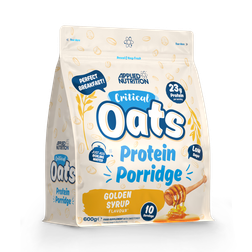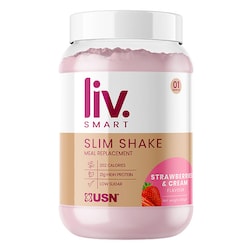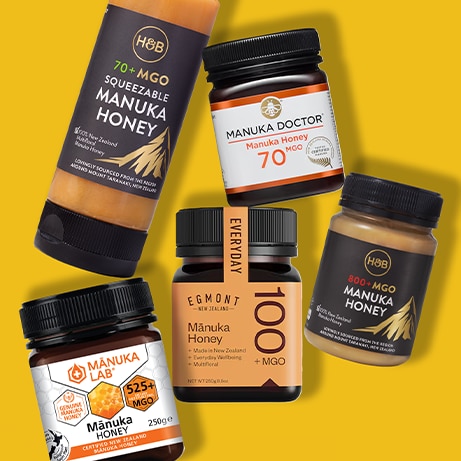15% off £25 or 20% off £35
Code:BASKET
5 high-protein breakfast ideas to power your day
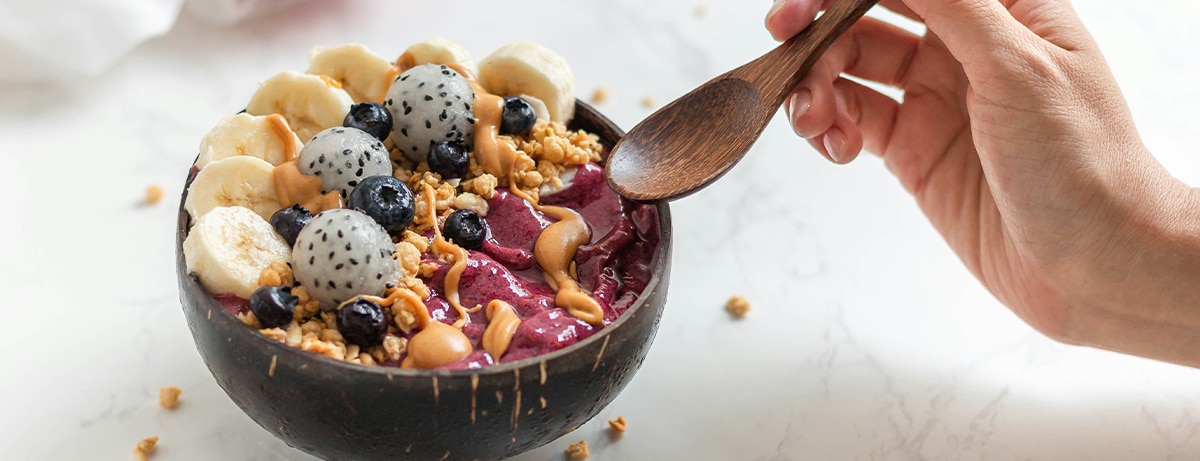
What can a high-protein breakfast do for you? Stay energised, support weight loss and build muscle mass with your new morning faves, handpicked by our nutritionist
Our top picks
8.7g protein per 40g
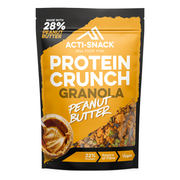
Acti-Snack
Acti-Snack Protein Crunch Peanut Butter Granola 350g
£5.00
High in fibre
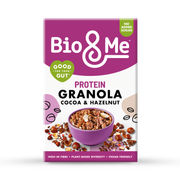
Bio & Me
Bio & Me Cocoa & Hazelnut Protein Gut-Loving Granola 360g
£3.95
No added sugar
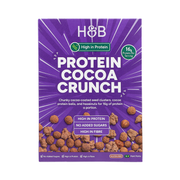
Holland & Barrett
Holland & Barrett Protein Cocoa Crunch Cereal 200g
£5.50
We all know that breakfast is the most important meal of the day. But what exactly makes up a healthy breakfast? And why's protein such a crucial part of it?
Eating foods that are high in protein first thing can be a fantastic way to give yourself energy. After all, research suggests that eating a high-protein breakfast every day may offer numerous possible health benefits – some include regulating blood sugar levels to supporting muscle mass.1-5
Join us and our senior nutritionist Alex Thompson as we take a closer look at some delicious breakfast ideas that are high in protein and anything but boring.
What are the possible benefits of a high-protein breakfast?
Protein is one of three essential macronutrients for health (the others being carbohydrate and
fat). And while it’s involved in many bodily functions, it’s especially important for cell and tissue
growth, as well as maintaining and building healthy muscles and bones.6
Who should eat a high-protein breakfast?
The average healthy adult only needs to consume about 0.75g of protein per kg of body weight per day.9 But if you’re looking to optimise your sports performance, it’s advised to increase your
intake to 1.4‒2.0g of protein per kg of body weight per day.5
5 high-protein breakfast ideas
Whether you follow a flexitarian, vegetarian or vegan diet, there are high-protein breakfast
meals to suit every taste. Here are five healthy ways to help energise your day.
1. Protein pancakes

For those of you who crave a sweeter breakfast, protein pancakes offer a great way to satisfy
your sweet tooth while still packing in the protein.
Making protein pancakes is as simple as including your favourite protein powder in your pancake batter. Blend two scoops (about 40g) of protein powder (a flavoured one is best) with two eggs, a banana, half a teaspoon of baking powder and a pinch of cinnamon.
Then, once your pancakes are all made up, throw on some healthy toppings like fresh fruit, yoghurt, a drizzle of honey or a nut butter of your choice.
If you’re on the hunt for a protein powder that tastes as good as it sounds, the Myprotein Origin Protein Chocolate Chip Cookie is an absolute winner. Each serving delivers a delicious 30g hit of protein – and at 1.2kg, there’s plenty to enjoy for weeks on end.
“This provides low levels of sugar alongside phased release protein. Creatine is great for supporting the ongoing muscle recovery process post-exercise,” says Alex. The beneficial effect is obtained with a daily intake of 3g of creatine
Feeling creative? Try using this flavour-packed option in a batch of fluffy protein pancakes. Imagine all the rich, gooey chocolate chips you love in a cookie, but in a pancake instead.
Or give these Alex-approved breakfast ideas a go: “Try blending with a banana and milled flaxseed for a quick on-the-go smoothie or stir into porridge or cereal for a protein addition. Added creatine is fantastic for supporting performance during high intensity exercise (e.g. weight training).”
2. Protein smoothies

Protein breakfast smoothies are a great way to get a quick protein boost, even if you’re short on
time. Better yet, you can tailor your protein smoothie to whatever ingredients you have on hand.
Simply add a scoop of protein powder to any fruit or vegetable smoothie you fancy. Then, to further increase the overall protein content, use yoghurt or soya milk instead of water, or add oats.
Smoothies are also a convenient way to add some extra nutrients to your diet. Leafy greens like spinach and kale are packed with iron, magnesium and potassium, for example, and berries can be great at delivering a hit of healthy antioxidants.12,13,14
Looking for a protein powder that tastes like a sweet treat but keeps things low in sugar? Diet Whey Protein Strawberry Milkshake is just that. It delivers a fruity strawberry flavour that’s smooth and easy to enjoy, with 20g of protein in every serving.
“A low sugar, high protein formulation with added green tea is ideal to support the maintenance of muscle mass thanks to the protein content,” says Alex.
And if you’re ready to shake things up and have some fun, we recommend blending into a protein smoothie.
3. Scrambled eggs or tofu

Scrambled eggs are a classic breakfast meal that’s high in protein ‒ one large egg contains
6.3g of protein.15 And, being a nutrient-dense ‘complete protein’, eggs have all nine essential
amino acids that your body needs.15,16
When served with wholegrain or seeded toast, this meal is packed full of energy-boosting protein, carbohydrates and healthy fat to keep you full the whole morning.17
For those following a plant-based diet, why not try a tofu scramble instead? Tofu is not only one of the few complete plant-based proteins but emerging research also suggests that it may reduce your risk of cardiovascular disease.16
So try scrambling silken tofu with vegetables to get a texture that’s similar to scrambled eggs.
If you’re after lower-carb bread that doesn’t compromise on taste, Fitbakes Keto Flaxseed Bread is all you knead. With only 2g of carbs but plenty of protein (6g to be exact) in every slice, it’s something we’re toasting to.
“It's a quick, high-protein and high-fibre breakfast choice for anyone on a lower-carb diet, which also works well for a mid-morning or afternoon snack. Try spreading on some nut butters,” says Alex.
The nutty flavour also makes it a delicious base for toppings like smashed avocado and egg (or scrambled tofu).
4. Oats

Oats are an incredibly versatile and nutritious breakfast food with several health benefits. As
well as being high in protein, they’re also an important source of dietary fibre, which can help
keep your gut healthy.18
However, if you’ve gotten bored of traditional porridge, there are plenty of alternative ways to rejuvenate this powerhouse breakfast food. For example, both overnight oats and baked oats can be prepped in advance if you’re short on time in the mornings.
Overnight oats are a no-bake version of porridge that can be prepared in as little as five minutes the night before. Simply add your oats to a liquid base (milk, plant milk or yoghurt), mix in a spoonful of chia seeds to give it a pudding-like texture and refrigerate overnight.
Baked oats have gained popularity in recent years as a healthy breakfast treat. Mix oats, milk (or plant milk), one tablespoon of protein powder, chopped fruit, eggs, one tablespoon of maple syrup for sweetness and a pinch of salt. Pour into an oven-safe dish and bake until cooked through before adding your favourite toppings.
Whichever way you serve your oats, healthy toppings can be added to give you an extra dose of vitamins and minerals. Nut butter, seeds and nuts all provide extra protein and nutrients, for example, whereas fresh fruit or dark chocolate can satisfy your sweet tooth while potentially providing important antioxidants (although further research is required).20-22
“A high protein version of the breakfast classic. Applied Nutrition Critical Oats in Golden Syrup flavour are combined with a clever blend of proteins (whey protein + milk protein). The protein content contributes to the maintenance and growth of muscle mass, supporting post-exercise recovery,” says Alex.
Creamy, sweet and oat-rageously scrummy, they deliver a proper helping of 23g of protein per serving. And if you want to take it up a notch try it with Manuka honey and a swirl of protein nut butter – it’s a combo we’re sure you’ll be totally oat-sessed with.
5. Yoghurt
Yoghurt is another popular healthy breakfast choice with various health benefits. Like all fermented foods, it can promote gut health and is a good source of protein and calcium.23

When it comes to yoghurt for breakfast, it’s essential to choose the right kind and be mindful of what you pair it with. So make sure to check the label to avoid any varieties with a high sugar content. You may also want to avoid yoghurt containing artificial sweeteners – very recent research has shown that it may disturb the gut microbiome.24
When choosing yoghurt, plain is better than fruit. Greek yoghurt, in particular, is a good breakfast choice, with close to 10g of protein in a 100g serving.25
Greek yoghurt can also be paired with healthy toppings like muesli, fresh fruit, berries, nuts and chia seeds for a high-protein breakfast that you can prep in advance.
USN Liv.Smart Slim Shake in Strawberries & Cream is as scrumptious as it sounds – smooth, fruity and with a generous 21g of protein per serving, it offers a smart meal replacement.
Looking for a new way to enjoy it? Whizz it into a triple berry immunity bowl for a refreshing, feel-good start to your day that’s full of colour, flavour and protein.
“It provides a balanced blend of carbs, protein and healthy fats, with added vitamins and minerals. A great option for those with busy mornings or for those who find it harder to stomach standard solid breakfasts,” says Alex.
The final say
Eating a high-protein breakfast every day is a great way to meet or exceed your daily protein
requirements.10 Research has shown that high-protein breakfasts are associated with various
health benefits, including weight loss, keeping blood sugar levels stable and helping to build and maintain muscle.1-5
Whether you prefer a savoury breakfast or a sweet one, there are plenty of high-protein
breakfast options to satisfy your taste and dietary choices.
While we strive for accuracy and balance, please be aware that this article may discuss
products available for purchase through Holland & Barrett. Consult a healthcare professional
before making any health-related decisions.
1. Carbone, JW., et al. ‘Dietary protein and muscle mass: Translating science to application and health benefit’. Nutrients. 2019;11(5):1136. Available from: https://www.ncbi.nlm.nih.gov/pmc/articles/PMC6566799/.
2. Xiao, K., et al. ‘Effect of a High Protein Diet at Breakfast on Postprandial Glucose Level at Dinner Time in Healthy Adults’. Nutrients. 2022;15(1):85. Available from: https://www.ncbi.nlm.nih.gov/pmc/articles/PMC9824806/.
3. Leidy, HJ., et al. ‘Beneficial effects of a higher-protein breakfast on the appetitive, hormonal, and neural signals controlling energy intake regulation in overweight/obese, “breakfast-skipping,” late-adolescent girls’. The American Journal of Clinical Nutrition. 2013;97(4):677–88. Available from: https://doi.org/10.3945/ajcn.112.053116.
4. Moon, J., et al. ‘Clinical Evidence and Mechanisms of High-Protein Diet-Induced Weight Loss’. Journal of Obesity & Metabolic Syndrome. 2020;29(3):166–73. Available from: https://www.ncbi.nlm.nih.gov/pmc/articles/PMC7539343/.
5. Jäger, R. International Society of Sports Nutrition Position Stand: Protein and Exercise. Journal of the International Society of Sports Nutrition [Internet]. 2017 Jun 20;14(1). Available from: https://pubmed.ncbi.nlm.nih.gov/28642676/.
6. Wu G. Dietary protein intake and human health. Food & function [Internet]. 2016 Jan 1 [cited 2024 Jun 11];7(3):1251–65. Available from: https://pubs.rsc.org/en/content/articlelanding/2016/fo/c5fo01530h
7. Paddon-Jones, D., et al. Protein, weight management, and satiety. The American Journal of Clinical Nutrition. 2008;87(5):1558S1561S. Available from: https://doi.org/10.1093/ajcn/87.5.1558S.
8. Chen, CN., et al. ‘Effects of Combined High-Protein Diet and Exercise Intervention on Cardiometabolic Health in Middle-Aged Obese Adults: A Randomized Controlled Trial’. Frontiers in Cardiovascular Medicine. 2021;8:2021. Available from: https://www.frontiersin.org/articles/10.3389/fcvm.2021.705282.
9. British Nutrition Foundation. ‘Protein’ [Internet]. [October 2023; Accessed 16 April 2024]. Available from: https://www.nutrition.org.uk/nutritional-information/protein/.
10. Verreijen, AM., et al. ‘A higher protein intake at breakfast and lunch is associated with a higher total daily protein intake in older adults: a post‐hoc cross‐sectional analysis of four randomised controlled trials’. Journal of Human Nutrition and Dietetics. 2020;34(2):384–394. Available from: https://doi.org/10.1111/jhn.12838.
11. Kim, JY. ‘Optimal Diet Strategies for Weight Loss and Weight Loss Maintenance.’ Journal of Obesity & Metabolic Syndrome. 2020;30(1):20–31. Available from: https://www.ncbi.nlm.nih.gov/pmc/articles/PMC8017325/.
12. Nemzer, B., et al. ‘Extraction and Natural Bioactive Molecules Characterization in Spinach, Kale and Purslane: A Comparative Study’. Molecules. 2021;26(9):2515. Available from: https://www.mdpi.com/1420-3049/26/9/2515.
13. Beyza Vahapoglu, Erskine E, Busra Gultekin Subasi, Esra Capanoglu. Recent Studies on Berry Bioactives and Their Health-Promoting Roles. Molecules/Molecules online/Molecules annual [Internet]. 2021 Dec 24 [cited 2024 Jun 11];27(1):108–8. Available from: https://www.ncbi.nlm.nih.gov/pmc/articles/PMC8747047/
14. NHS Choices. Others - Vitamins and minerals [Internet]. 2024 [cited 2024 Jun 11]. Available from: https://www.nhs.uk/conditions/vitamins-and-minerals/others/
15. Puglisi, MJ., et al. ‘The Health Benefits of Egg Protein’. Nutrients. 2022 Jul 15;14(14):2904. Available from: https://www.ncbi.nlm.nih.gov/pmc/articles/PMC9316657/.
16. Qin, P., et al. A review on plant-based proteins from soybean: Health benefits and soy product development’. Journal of Agriculture and Food Research. 2022;7(7):100265. Available from: https://www.sciencedirect.com/science/article/pii/S2666154321001678.
17. NHS Choices. Starchy foods and carbohydrates [Internet]. 2024 [cited 2024 Jun 11]. Available from: https://www.nhs.uk/live-well/eat-well/food-types/starchy-foods-and- carbohydrates/
18. Paudel, D., et al. ‘A Review of Health-Beneficial Properties of Oats’. Foods. 2021;10(11):2591. Available from: https://www.ncbi.nlm.nih.gov/pmc/articles/PMC8625765/.
19. Lopez MJ, Mohiuddin SS. Biochemistry, Essential Amino Acids [Internet]. Nih.gov. StatPearls Publishing; 2024 [cited 2024 Jun 11]. Available from: https://www.ncbi.nlm.nih.gov/books/NBK557845/
20. Balakrishna, R., et al. Consumption of Nuts and Seeds and Health Outcomes Including Cardiovascular Disease, Diabetes and Metabolic Disease, Cancer, and Mortality: An Umbrella Review. Advances in Nutrition. 2022;13(6). Available from: https://doi.org/10.1093/advances/nmac077.
21. Jideani, AIO., et al. Antioxidant-rich natural fruit and vegetable products and human health. International Journal of Food Properties. 2021;24(1):41–67. Available from: https://doi.org/10.1080/10942912.2020.1866597
22. Zugravu, C., et al. Dark Chocolate: To Eat or Not to Eat? A Review. Journal of AOAC International. 2019;102(5):1388–96. Available from: https://doi.org/10.1093/jaoac/102.5.1388.
23. Hadjimbei, E., et al. ‘Beneficial Effects of Yoghurts and Probiotic Fermented Milks and Their Functional Food Potential’. Foods. 2022;11(17):2691. Available from: https://www.ncbi.nlm.nih.gov/pmc/articles/PMC9455928/.
24. Shil, Aparna, et al. ‘The Artificial Sweetener Neotame Negatively Regulates the Intestinal Epithelium Directly through T1R3-signaling and Indirectly through Pathogenic Changes to Model Gut Bacteria.’ Frontiers in Nutrition. 2024; vol. 11. Available from: https://doi.org/10.3389/fnut.2024.1366409.
25. US Department of Agriculture. ‘FoodData Central: Yoghurt, Greek, plain, lowfat’. [Internet]. Available from: https://fdc.nal.usda.gov/fdc-app.html#/food- details/170903/nutrients

